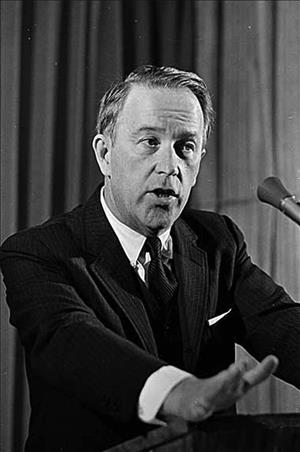On September 15, 1970, Senator Henry M. "Scoop" Jackson (1912-1983) easily wins the Democratic Senate primary by defeating peace candidate Carl Maxey (1924-1997), a Spokane attorney and civil rights leader. Maxey, the champion of the anti-war wing of the Democratic Party, has fiercely denounced Jackson's outspoken support for military spending and the Vietnam War. Maxey finishes a distant second to Jackson in the primary, but still wins far more votes than Republican nominee Charles W. Elicker.
The 1970 campaign was waged against a background of great political turbulence, as the Democratic Party, the state, and the nation were rocked by deep and bitter divisions over the increasingly unpopular Vietnam War. The divisiveness frequently spilled over into street protests in Seattle and across the country, reaching a crescendo in May following President Richard M. Nixon's (1913-1994) announcement that the U.S. military would enter Cambodia. The Cambodia incursion triggered massive demonstrations, and the killings of four anti-war protestors at Kent State in Ohio and two demonstrators at Jackson State in Mississippi led to even greater protests.
Anti-war Challenge
Jackson, who was first elected to the House of Representatives in 1940 as a supporter of Franklin D. Roosevelt's (1882-1945) New Deal, remained firmly liberal on domestic policy for his entire 43-year Congressional career, sponsoring ground-breaking environmental legislation and championing social welfare programs. These progressive credentials meant little in 1970, when the great divide within the country and within the Democratic Party was between pro-military "hawks" and anti-war "doves." Jackson's career-long advocacy of increased military spending and his die-hard support for the war made him a leading hawk and anathema to the increasingly dovish liberal wing of the party.
National Democrats active in the peace movement, including Senator and presidential candidate Eugene McCarthy (b. 1916), Representative Allard Lowenstein (1929-1980), and economist John Kenneth Galbraith (b. 1908), encouraged state Democrats in the Washington Democratic Council (WDC), an anti-war group, to mount a primary challenge to Jackson. However, no established Democratic politician would take on Jackson, who was not only the most successful vote-getter in the state's history, but had aided many of them in their political careers.
Carl Maxey
In the end Carl Maxey, the WDC chair, resigned his position to run against Jackson. The first African American to become an attorney in Eastern Washington, Maxey was born in Tacoma and spent much of his childhood in a Spokane orphanage. After serving as a medic during World War II, he won an NCAA boxing championship while in college and earned a law degree from Gonzaga University. As a lawyer, he defended minorities and fought for civil rights, supporting the NAACP and often taking on police, prosecutors, and other local government officials.
By the mid-1960s, Maxey was an outspoken critic of the Vietnam War, which he saw as unjust and unnecessary and as unfairly impacting African Americans who were drafted into the military at disproportionate rates. Maxey admired Jackson's domestic views, especially his support for labor, and had worked for Jackson in his first three Senate campaigns. But he abhorred the senator's support for the war and the draft and his opposition to military spending cuts.
Maxey's criticism of Jackson was biting. He called him "a Napoleonic little senator," denounced Jackson's "platform of a continued draft that kills sons and brothers," and stated, "Leaving peace in the hands of Henry Jackson is like leaving a lion to guard the Sunday roast" (Prochnau and Larsen, 314).
Attacks Sting, but Jackson Wins Easily
The Maxey forces shocked Jackson and the party establishment by winning the endorsement of the King County Democratic Convention, held in May during the uproar over the Cambodia incursion and Kent State, and by enacting an anti-war, anti-draft platform at the state party convention held in July in Spokane. Jackson was shaken and angered when a demonstration by Maxey delegates disrupted his speech at the Spokane convention.
The repudiation of his positions in the party platform and the harsh attacks, demonstrations, and heckling he endured on the campaign trail embittered Jackson toward his opponents within the party. Despite his liberal domestic record, he increasingly positioned himself as a moderate, declaring frequently "I'm proud of the fact that during my term in the Senate I opposed both McCarthys" (Prochnau and Larsen, 319) -- a reference linking anti-war Eugene McCarthy to anti-communist Republican Joe McCarthy who led the witch hunts of the 1950s.
While the attacks by Maxey and the anti-war forces stung Jackson they did not reduce his support among primary voters and may even have increased it, given Washington's blanket primary system that allowed Republicans to vote in the Democratic race. Jackson beat Maxey in all 39 counties, winning re-nomination with 497,309 votes to the challenger's 79,201. However, Maxey far out-distanced the remaining seven primary candidates, which included two other Democrats and five Republicans. State Senator Charles Elicker gained the Republican nomination with only 33,262 votes, a showing that foreshadowed Jackson's record-setting victory over Elicker in the November general election.

